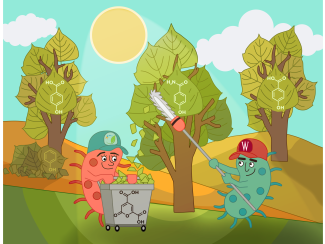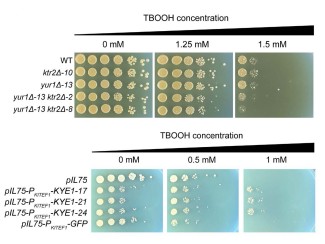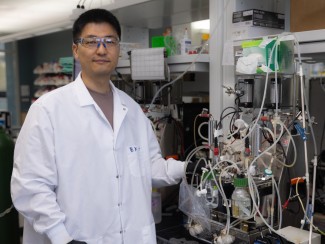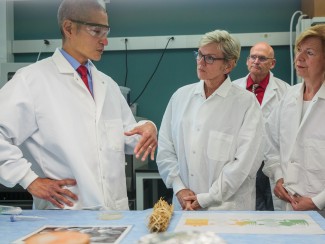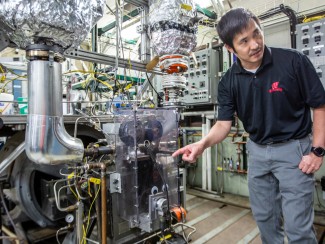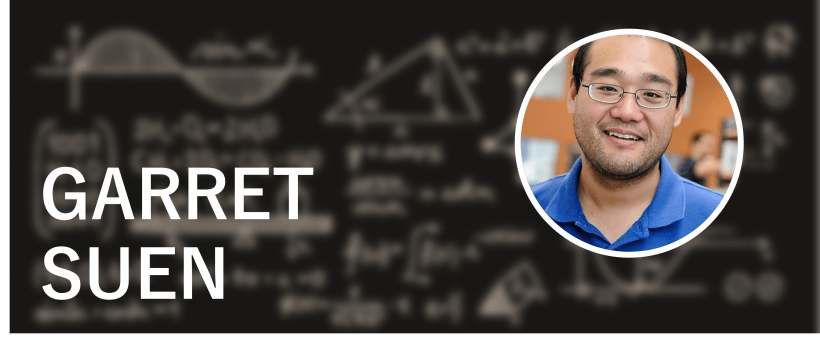
WHAT DID THE 2012 EARLY CAREER AWARD ALLOW YOU TO DO?
The support of the Department of Energy Early Career Research Program award allowed my team and me to gain a better understanding of how nature has optimized plant biomass degradation - using a model, natural system.
The process of biofuel production is one that nature already accomplishes. At the same time as humans domesticated the cow for our purposes of producing milk and meat, they also domesticated the microbes inside the animal. We drove the microbes towards increased plant biomass degradation to support the animal.
Our work sought to understand how the domestication process over thousands of years has pushed the system toward one of the largest enterprises of plant biomass conversion to short-chain fatty acids. These short-chain fatty acids – obtained from the cellulose present in the plant cell walls and broken down into simple sugars - are the basis of all the biofuels that we think about. These include ethanol, butanol, jet fuels, and others.
Since cows have been converting plant biomass for thousands of years, we theorized that we could learn something by understanding the microbes that are key cellulose degraders in the rumen. We have been studying two of these bacteria in the genera Fibrobacter and Ruminococcus.
What the award allowed us to do is take these bacteria into the lab and determine how they degrade cellulose from two perspectives. The first one was to determine what genes are turned on and off when the bacteria come into contact with cellulose. That in turn allowed us to identify the specific enzymes that the bacteria express – which they then used to degrade cellulose. These enzymes, and our understanding of the biology of these organisms, might be useful from an industrial context – to take recalcitrant plant material, break it down into sugars, then ferment it into interesting and useful products.
At the same time, we also worked to broaden our understanding of these bacteria in other natural systems. We realized that these bacteria are only ever found associated with herbivores. So, we partnered up with our local zoo and cultured different variants of these bacteria from a wide range of herbivores such as elephants, buffalos, rhinos, giraffes, and capybaras. What we found was these herbivore variants also contained novel genes and enzymes. We then characterized them to add to our growing pool of industrially relevant enzymes.
The Early Career Research Program award also contributed to the training of three graduate students; two of them are working in industry and one of them is in academia.
ABOUT:
Garret Suen is an associate professor of Bacteriology at the University of Wisconsin - Madison
SUPPORTING THE DOE SC MISSION:
The Early Career Research Program provides financial support that is foundational to early career investigators, enabling them to define and direct independent research in areas important to DOE missions. The development of outstanding scientists and research leaders is of paramount importance to the Department of Energy Office of Science. By investing in the next generation of researchers, the Office of Science champions lifelong careers in discovery science.
For more information, please go to the Early Career Research Program.
THE 2012 PROJECT ABSTRACT:
Deciphering the Genetic and Molecular Underpinnings of Carbohydrate‐Degrading Systems in Ruminal Bacteria
Abstract
Biofuels like ethanol can be obtained from cellulose present in plant cell walls. A challenge in the production of biofuels is the efficient breakdown of cellulose into simple sugars. Current industrial approaches rely on cocktails of cellulose‐degrading enzymes. These strategies can be improved by identifying and characterizing more active enzymes. Arguably the most optimized natural cellulose degrading system is found in the rumen of domesticated cows. The rumen contains a diverse group of bacteria with highly active enzymes that digest cellulose in feed and convert this energy source into nutrients usable by the cow. This research will characterize the mechanism through which three bacteria from the rumen degrade cellulose. Each of these bacteria employs different strategies for cellulose degradation and will provide contrasting models that can increase our understanding of this fundamental process. This work will leverage existing genomic sequences for these bacteria to identify the genes and enzymes relevant for cellulose degradation. Importantly, these enzymes will be purified and biochemically tested for their capacity to degrade cellulose. Novel enzymes characterized in this way will not only expand our current set of cellulose‐degrading enzymes but will also provide insights into how these specialized microbes accomplish cellulose degradation in natural systems. The results of this research will advance the DOE mission for the production of advanced biofuels.
RESOURCES:
MR Christopherson, JA Dawson, DM Stevenson, AC Cunningham, S Bramhacharya, PJ Weimer, C Kendziorski, & G Suen, “Unique Aspects of Fiber Degradation by the Ruminal Ethanologen Ruminococcus albus 7 Revealed by Physiological and Transcriptomic analysis.” BMC Genomics 15, 1066 (2014.) [DOI:https://doi.org/10.1186/1471-2164-15-1066]
AP Neumann, PJ Weimer & G Suen, “A Global Analysis of Gene Expression in Fibrobacter succinogenes S85 Grown on Cellulose and Soluble Sugars at Different Growth Rates.” Biotechnology for Biofuels 11, 295 (2018). [DOI: https://doi.org/10.1186/s13068-018-1290-x]
AP Neumann & G Suen, “The Phylogenomic Diversity of Herbivore-associated Fibrobacter spp. is Correlated to Lignocellulose-degrading Potential.” mSphere 3, e00593 (2018). [DOI:https://doi.org/10.1128/mSphere.00593-18]

